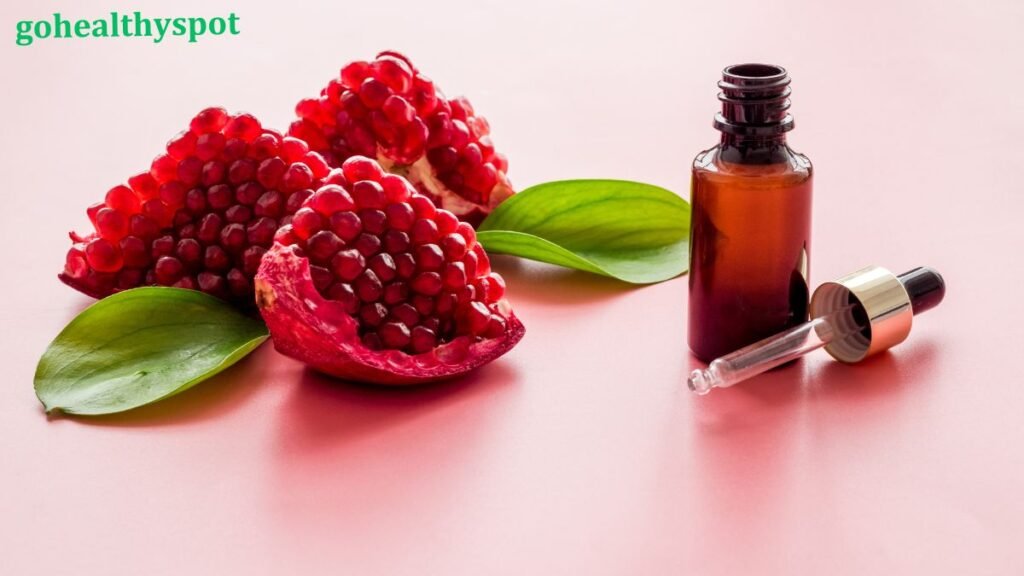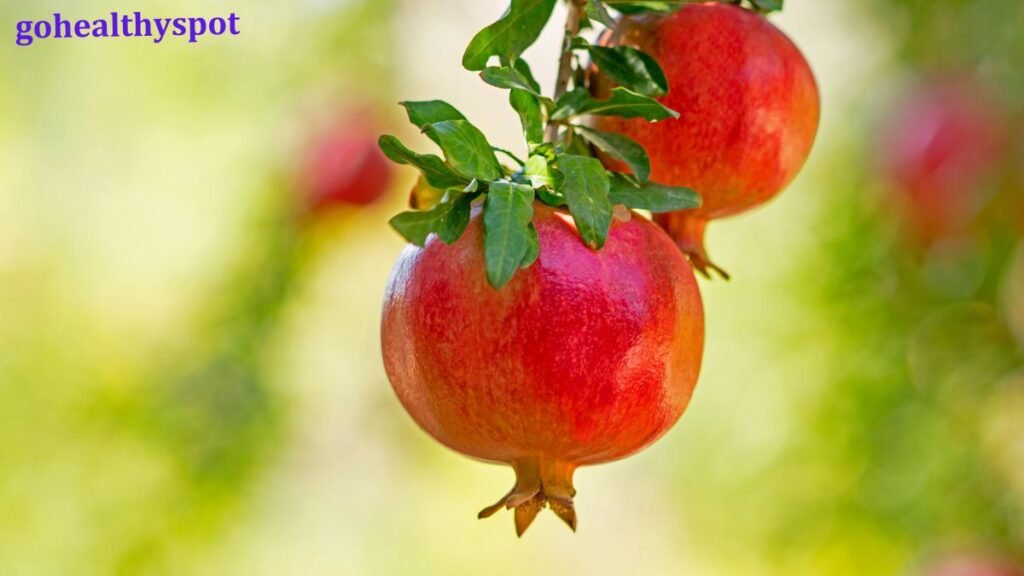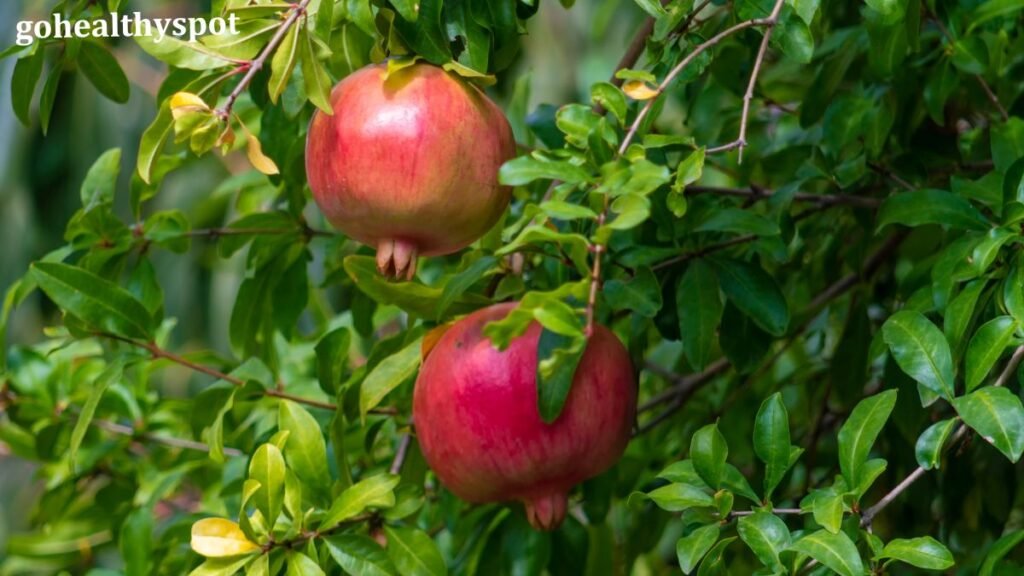Key Topics of Pomegranate Benefits
Introduction
Scientific Name of Pomegranate : Punica granatum.
Pomegranates, are often celebrated as a superfood due to their rich nutritional profile and numerous health benefits. pomegranates have been used for centuries in traditional medicine to promote overall wellness. They are particularly renowned for their anti-inflammatory properties, heart health benefits, and potential cancer-fighting abilities.
The vibrant seeds, or arils, are not only delicious but also packed with nutrients that support digestion, boost immunity, and improve skin health. lets explore the pomegranate benefits.
Pomegranate Benefits for Skin :
Pomegranates are a powerhouse of skin-loving nutrients, making them an excellent addition to any skincare routine. Rich in antioxidants like vitamin C, pomegranates help combat reactive oxygen species that can cause premature aging, leading to smoother, more youthful skin. The fruit’s high content of polyphenols and flavonoids also aids in reducing inflammation and preventing skin damage from environmental stressors like pollution and UV radiation.
Additionally, pomegranates are known for their natural exfoliating properties, which can help in removing dead skin cells and unclogging pores, leading to a brighter and clearer complexion. The fruit’s punicic acid, a type of omega-5 fatty acid, helps to hydrate the skin, making it soft and supple.
Pomegranates also have anti-inflammatory and anti-bacterial properties, which can be beneficial in treating acne and other skin conditions. Whether ingested or applied topically, pomegranates can significantly improve skin texture, tone, and overall health.

Pomegranate Benefits for Male and Female :
Benefits for Men:
Pomegranates offer several specific benefits for men, particularly in supporting heart health and enhancing reproductive function. The fruit is rich in antioxidants, which help lower blood pressure, reduce cholesterol levels, and improve overall cardiovascular health—factors that are especially important for men as they age. Pomegranates have been linked to improved blood flow, which can enhance erectile function and may aid in the treatment of erectile dysfunction.
Note : Studies also suggest that regular consumption of pomegranate juice can boost testosterone levels, contributing to better sexual health and overall vitality.Benefits for Women:
For women, pomegranates provide a host of benefits that support hormonal balance, skin health, and bone strength. The antioxidants and phytoestrogens found in pomegranates can help regulate estrogen levels, making the fruit particularly beneficial during menopause by alleviating symptoms such as hot flashes and mood swings.
Pomegranates also promote skin hydration and elasticity, which can help combat the signs of aging, a concern for many women. Moreover, the fruit’s high vitamin C content aids in collagen production, vital for maintaining youthful skin. Additionally, the anti-inflammatory properties of pomegranates can help reduce the risk of osteoporosis, a condition more prevalent in women, by supporting bone health.
Pomegranate Benefits for Weight Loss :
Pomegranate is a nutrient-rich fruit that offers several benefits for weight loss. Some of them are
- Low in Calories
Pomegranate is low in calories, making it a great addition to a weight-loss diet. A 100-gram serving of pomegranate contains only about 83 calories. - Rich in Fiber
The fruit is high in dietary fiber, which helps promote a feeling of fullness and reduces overall calorie intake. The fiber content aids in digestion and prevents overeating by keeping you satisfied for longer periods. - Boosts Metabolism
Pomegranate contains antioxidants, particularly polyphenols, which can help boost metabolism and promote fat burning. A higher metabolic rate can support weight loss by helping the body burn more calories throughout the day. - Regulates Appetite
The antioxidants in pomegranate, along with its fiber content, help regulate appetite and reduce cravings, which are key factors in managing weight. - Low Glycemic Index
Pomegranate has a low glycemic index, which means it releases sugar slowly into the bloodstream, preventing spikes in blood sugar levels. This helps in controlling hunger and reducing the risk of overeating. - Hydration and Detoxification
The high water content in pomegranate keeps you hydrated, which is essential for overall health and weight management. Staying hydrated can also help flush out toxins from the body, aiding in detoxification and weight loss. - Anti-inflammatory Properties
Pomegranate has anti-inflammatory properties that can help reduce inflammation in the body, which is often linked to weight gain and obesity. By reducing inflammation, it can help support overall health and weight loss efforts. - Supports Exercise Recovery
The antioxidants and vitamins in pomegranate, particularly vitamin C, help in muscle recovery after exercise. This allows for more consistent workouts, which are crucial for weight loss.

Pomegranate Benefits for Male & Female sexually :
Pomegranate Benefits for Male
Pomegranates can be beneficial for male sexual health due to their antioxidant content. These antioxidants help protect sperm from oxidative damage, which can improve sperm quality and motility. This, in turn, can positively impact fertility and overall sexual function. Additionally, some studies suggest that pomegranates may help regulate testosterone levels, a hormone essential for male sexual health.
Pomegranate Benefits for Female
Pomegranates can also provide benefits for female sexual health. The antioxidants in pomegranates can help improve blood flow to the reproductive organs, which can enhance sexual arousal and sensitivity. Additionally, some studies suggest that pomegranates may help balance hormones, which can positively impact libido and overall sexual satisfaction.
Note : It’s important to note that while pomegranates can be a beneficial addition to a healthy diet, they are not a confirm solution for sexual health issue.
Pomegranate Side Effects :
While pomegranate is generally safe and offers numerous health benefits, there are some potential side effects to be aware of, especially when consumed in excess. One common concern is its high natural sugar content, which can be problematic for individuals with diabetes or those monitoring their blood sugar levels. Although pomegranate has a low glycemic index, consuming large amounts of the fruit or its juice can still lead to elevated blood sugar levels.
Overconsumption of pomegranate may contribute to weight gain due to its caloric content, even though it is relatively low in calories compared to other fruits. Another potential side effect involves allergic reactions, which, although rare, can occur in some individuals. Symptoms of a pomegranate allergy may include itching, swelling, difficulty breathing, or gastrointestinal distress such as nausea and vomiting.
Additionally, pomegranate juice can interact with certain medications, particularly blood thinners like warfarin, and medications for high blood pressure, potentially leading to adverse effects. It’s important to consult a healthcare provider before incorporating large amounts of pomegranate or its supplements into your diet, especially if you have underlying health conditions or are taking prescription medications.
Nutrition and Vitamins in Pomegranate :
Pomegranates are not only delicious but also packed with essential nutrients and vitamins. This vibrant fruit is a rich source of antioxidants, including polyphenols and punicalagins, which help protect your cells from damage caused by reactive oxygen species.
| Nutrient | Amount per 100g |
| Calories | 60-70 kcal |
| Total Fat | 0.1-0.2 g |
| Protein | 0.5-1 g |
| Carbohydrates | 15-18 g |
| Dietary Fiber | 0.5-1 g |
| Sugars | 13-16 g |
| Vitamin C | 10-15% |
| Potassium | 5-8% |
| Folate | 10% |
| Antioxidants | High |
In addition to antioxidants, pomegranates are also a good source of vitamins and minerals. They contain vitamin C, which is essential for immune function and collagen production. Pomegranates are also a source of potassium, a mineral that helps regulate blood pressure. Other nutrients found in pomegranates include vitamin K, fiber, and folate.

Discover our world of Veggies and Fruits GOHEALTHYSPOT.COM
Frequently Asked Questions(FAQ)
Q1. Does pomegranate increase hemoglobin?
Yes, pomegranate can help increase hemoglobin levels. Pomegranates are rich in iron, which is a key component in hemoglobin production. consuming pomegranates, whether as fresh fruit, juice, or in other forms, can contribute to improving hemoglobin levels, especially in individuals with iron deficiency anemia.
Q2. Is pomegranate a citrus fruit?
No, pomegranates are not citrus fruits. While they share some characteristics with citrus fruits, like a sweet and tart taste, they belong to a different botanical family. Pomegranates are in the Punicaceae family, while citrus fruits are in the Rutaceae family.
Q3. Does eating pomegranate seeds gives any side effects?
Yes, eating pomegranate seeds can have side effects.
Stomach upset: Some people may experience diarrhea or bloating.
Mouth sores: The seeds can be hard and may scratch the inside of your mouth.
Allergic reactions: People with allergies to other fruits may also be allergic to pomegranates.
It is important to note that these side effects are rare and most people can eat pomegranate seeds without any problems.
Q4. Who should not eat pomegranates?
People with allergies to other fruits, especially those in the same family as pomegranates (such as apples, pears, and plums), should avoid eating them. Additionally, individuals who have had a severe allergic reaction to pomegranates in the past should not consume them.
Q5. What organ is pomegranate good for?
Pomegranates are not particularly good for any specific organ. However, they are a good source of antioxidants and other nutrients that can benefit overall health.
Q6. Is pomegranate good for sperm?
Yes, pomegranates can be beneficial for sperm health. The antioxidants found in pomegranates, particularly polyphenols, have been shown to help protect sperm from oxidative damage, which can reduce sperm quality. This can potentially improve sperm motility, concentration, and morphology.
Disclaimer : This article provides general information and should not be considered as medical advice. It's essential to consult with a healthcare professional for any health concerns or before making significant changes to your diet or lifestyle.